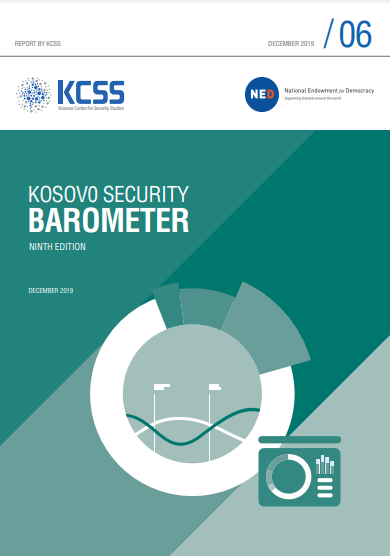13/12/2019

Kosovar Centre for Security Studies (KCSS)
National Endowment for Democracy (NED)
Donika Marku
The Kosovo Security Barometer (KSB) is a distinctive tool through which the Kosovo Center for Security Studies (KCSS) measures public perceptions in Kosovo. The ninth edition of the Kosovo Security Barometer consists of two chapters. While the first chapter measures citizens’ perceptions of trust in security, justice, central and local institutions, 1 the second chapter presents citizens’ perceptions of corruption in these institutions.
Perceptions of trust in state institutions and corruption may vary by ethnicity2, gender, area and district. In addition, the report also contains a combined analysis of the data beyond the general interpretation, which enables the public to have a clearer and more meaningful view of citizens’ trust in institutions. In this regard, analyzing the trust results by rural/urban areas, geographical regions, ethnicity and gender, as well as other supplementary data related to the respondents, will enable the audience to assess and analyze the opinions of Kosovo citizens on issues related to security and justice in Kosovo during 2019.
In addition to the results of the 2019 Kosovo Security Barometer, the key findings regarding institutional sectors follow:
●● Security institutions continue to be more trusted than the justice and central one also in this edition of the Kosovo Security Barometer;
●● Justice institutions (courts and prosecution) continue to enjoy lower trust than security ones. Furthermore, the 2019 results show that compared to the previous year, there is a decrease in public trust in the rule of law institutions;
●● The Assembly and Government continue to remain the least trusted institutions in the eyes of citizens;
●● The Government of Kosovo is the least trusted of all the institutions measured in this edition of the Barometer. In addition, the Barometer has recorded that respondents with lower monthly income have higher trust in the Government than those with higher income;
●● Municipal institutions continue to enjoy higher credibility than central ones.
In addition to the general findings on trust in sectors, the results provide an interesting insight into specific institutions, where:
●● The Kosovo Security Force continues to be the most trusted of all the institutions measured in this edition of the Barometer;
●● Similar to previous year, men reported higher trust towards the Kosovo Security Force than women;
●● Although with a two percent decrease, 59 percent of respondents expressed their trust in Kosovo Police;
●● Women respondents trust the Kosovo Police and justice institutions more than men, thus potentially mirroring a women’s sense of insecurity in the society;
●● The novelty of this edition of the KSB is the measuring of citizens’ trust in the Kosovo Correctional Service and Customs of Kosovo. The results show low trust in the Correctional Service (30 percent), while trust in the Customs was not satisfactory either (35 percent).
MAIN FINDINGS RELATED TO CORRUPTION:
●● More than half of the respondents stated they see Courts and Prosecutors as corrupt. For respondents, Courts amount to the most corrupt institution in Kosovo;
●● There is an increase in percentage of respondents who deem Kosovo local municipalities as corrupt;
●● The Kosovo Security Force is perceived as the least corrupt institution;
●● Kosovo Security Barometer 2019 results show that the level of perception of police corruption has decreased by four percentage points compared to 2018;
This report is published in the framework of the Kosovo Security Barometer Programe. Perceptions presented in this report are a summary of information gathered from respondents and it solely demonstrates how people perceive institutions. It is no way a conclusive assessment on the quality of the work of institutions subject to this study. It shall serve as an instrument to them toward addressing potential shortcomings, but also an indicator of the effectiveness of their communication with the people.
The views presented in this report are perceptions of the respondents and do not necessarily represent the views of Kosovar Centre for Security Studies. Opinions expressed in this report do not represent the views of the National Endowment for Democracy (NED).